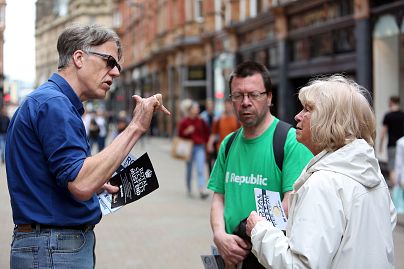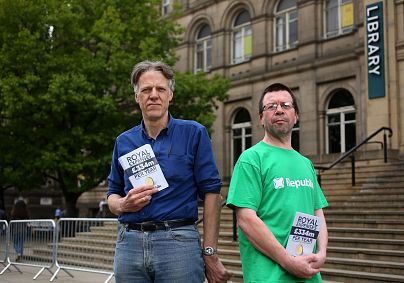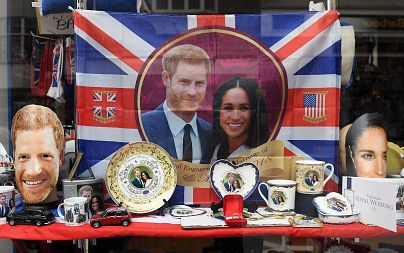Some 17 percent of Brits want to get rid of their monarchy, and 66 percent aren't excited by the royal wedding, polls suggest.
LEEDS, England — Plans for a revolution against the British royal family hit a hiccup on a recent sunny morning in the north of England.
Anti-monarchy campaigners Shaun Iggleden and Nigel Catling are handing out leaflets ahead of Saturday's wedding ofPrince Harry and Meghan Markle, when they are accosted.
"I think what you're saying is disgusting," Shirley Stephenson, 76, a retired florist, tells them. "England is a lovely country and our royalty are lovely people. Our monarchy has been here for centuries — why do you want to get rid of them now?"
The dressing down is a common experience for Iggleden and Catling. And yet, despite their more vocal opponents, their message is supported by a significant minority across the country.
Some 17 percent of Brits want to get rid of their monarchy, according to the latest figures from pollster IPSOS Mori. That's around 7.8 million people when taken as a percentage of a total voting public of 45 million.
Only 55 percent said they'd be disappointed if the monarchy ended after Queen Elizabeth II dies, another study found this month.
Spearheading this drive to abolish the monarchy is the campaign group Republic. Iggleden and Catling are leading figures in its Leeds chapter.
"We're not talking about beheading anybody, or taking the royals into the woods and shooting them," says Iggleden, 52, a truck driver.
"I compare supporting the monarchy to being very religious, it's like a faith. What we're doing is challenging people's faith in the monarchy."
"And we're not against the royals as individuals. I've nothing against Elizabeth Windsor," he adds, mischievously referring to the queen by her name, not her royal title. "I'm sure she's a fine lady — I've never met her — it's the institution of the monarchy that we're against."
Republic has some 5,000 paying members and, if anything, it welcomes royal occasions like the one this weekend.
"It seems to be when there's a big royal event, whether it's a wedding or a big jubilee, our membership and support grows," Iggleden says, standing out in a green T-shirt bearing his organization's name.
Republic's central argument is this: An unelected family, whose members achieved their status through the lottery of birth alone, has no place reigning over a modern democracy.
The U.K. has a constitutional monarchy, which means in practice that its royalty is restricted to ceremonial duties, while leaving actual politics to elected officials. This is different from an absolute monarch, like Saudi Arabia's king, who has supreme authority over his subjects.
Technically, the monarch can still declare war, dissolve Parliament and refuse to sign legislation. But convention, as well as the current queen's personal history of impartiality, means that she'd likely never actually use these powers other than to rubber stamp decisions lawmakers have already made.
The monarchy, according to its official website, "acts as a focus for national identity, unity and pride; gives a sense of stability and continuity; officially recognizes success and excellence; and supports the ideal of voluntary service."
What worries republicans is what happens once the queen's son, Prince Charles, becomes king.
"The vast majority of the population have only known the queen as head of state," says Catling, 59, who works for the local government. "So when Charles is there, people might start thinking, 'Hang on a sec, how come he's got the job? I didn't vote for him.'"
Unlike his popular mother, Charles has a controversial history of trying to meddle in politics.
Most notably, it was revealed in 2015 that he had written to senior government ministers in a series of "black spider memos" — so named because of his bad handwriting — lobbying lawmakers on issues ranging from unscientific alternative medicine to obscure environmental causes.
Many also hold him responsible for the only real stumble in royal popularity in recent decades. His approval ratings still suffer from his affair with Camilla Parker Bowles, now the Duchess of Cornwall, while he was married to Princess Diana.
If he were to throw his weight around, there would be little in the way of official rules to stop Charles, republicans say. Britain has a hazy constitution, which is not contained in one document and instead sprawls across myriad acts of Parliament, court rulings and historical convention.
In this sense, the future king presents both a worry and an opportunity for republicans.
"Charles has been very public in what he thinks and very public in what he wants to do," says Graham Smith, Republic's chief executive. "When Charles becomes king, the gloves will be off in terms of challenging his position and his influence on government."
One important pro-monarchy argument republicans reject is that the queen attracts a fortune to the country through tourism and trade.
Brand Finance, a London-based consultancy, valued the royals' net contribution to the economy last year at just under1.5 billion pounds ($2 billion).
Republic counters that tourists would still come to Britain for its palaces and castles even if there were no royals living in them. Just look at France, they say.
Its calculations of the true cost of the monarchy comes to around 334 million pounds a year (about $450 million).
Ultimately, republicans maintain that no amount of money would compensate for the damage they say the queen does to the principle of democratic values.
As long as the British people remain subjects of an unelected monarchy, Britain in 2018 is a place where who you are, not what you've done, is key, so their argument goes.
Talk of republican revolt may surprise Americans flocking to the U.K. to see California-native Markel join the House of Windsor.
As romantic as this fairy tale may seem, Smith points out that the U.S. was founded after a war to free itself from the British rule.
"I would say to any American, 'Don't wish on us what you wouldn't want for yourself,'" he says. "I think that Americans, quite rightly, value the democratic principles entrenched in their Constitution."
Smith has even laid out how the path to republicanism might look.
After Charles becomes king, the U.K. will have a monarch whose opinions are known. If the government happened to change one of its policies so it chimed with Charles' views, Smith believes this could spark a constitutional crisis and possibly a referendum on the monarchy.
"The immediate question will be, 'Have you done that because you think it's in the interests of the country, or because our new king is having a word in the ear of the prime minister?'" Smith says.
He also believes that support for republicanism may be higher than the polls suggest, with most people actually feeling ambivalent and thus ready to be swayed under the right conditions.
Supporting this, a YouGov pollthis month found 66 percent of people weren't interested in this weekend's wedding — a collective "So what?" from two-thirds of the population.
In downtown Leeds, there is clearly some support for change.
"I'm not saying we should abolish them right now, but if they started doing all types of craziness, maybe I would," says 19-year-old student Letsatsi Makhokolo after accepting a leaflet.
Nevertheless, even a hint of fundamental change to the monarchy are clearly a long way off.
"Most people are more interested in shopping than debating the pros and cons of the constitution and the monarchy," Iggleden says with a sigh. "You get the ones who say, 'You're a traitor to your country' and that kind of stuff. Very few people actually want to engage in debating the issue of the monarchy."
These campaigners know how difficult it is to overturn hundreds of years of history. They're in this for the long haul, and liken their struggle to the ones that took decades — centuries even — to give women the vote and abolish slavery.
"I compare supporting the monarchy to being very religious, it's like a faith. What we're doing is challenging people's faith in the monarchy," Cartling says. "This sort of stuff we talk about, it's all dry, it's all very logical. But for a lot of people it's more emotional. They just say, 'I like the queen.'"






